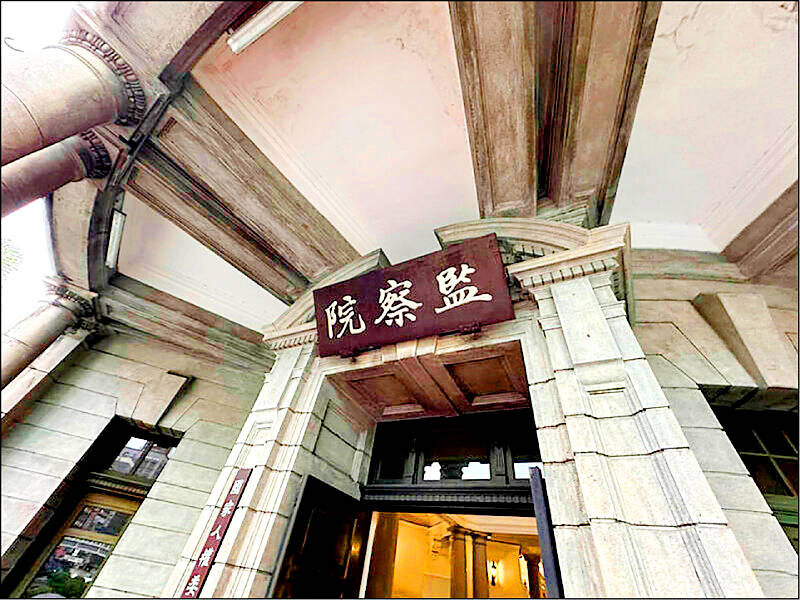Telecommunications fraud is a national security threat that poses a significant risk of harming Taiwanese lives and property, the Control Yuan said yesterday as it called on the government to step up a campaign against scammers.
Taiwanese law enforcement has reported 20,000 domestic cases of telecom fraud this year, marking a historic high despite the implementation of the anti-fraud action plan versions 1.0 and 1.5, it said in a news release.
The soaring rate of fraud is worrisome and suggests underlying weaknesses in the government’s approach to regulating telephone number registrations, digital platforms and cryptocurrencies, it said.

Photo: Taipei Times
The Cabinet should monitor and improve anti-fraud programs, especially with regard to using preventive measures and boosting effectiveness, the Control Yuan said.
Although the government’s public information campaign involving 16 agencies has supposedly been heard, read or seen 330 million times, repeated exposure is not an indication of success, it said.
Public-private partnerships and an evidence-based approach should guide the government’s policy going forward, it said, adding that cooperation with businesses, civic and religious groups, and community organizations is crucial to efforts to combat fraud.
The government’s claimed success in preventing fraudsters from accessing telecom services should be treated with skepticism, as one alleged scammer in a recent case obtained the use of 300,000 phone numbers, it said.
The Control Yuan urged regulators to strengthen the government’s collaboration with telecom service providers to detect or prevent fraud at the source.
Telecom data should be more closely monitored, it said.
It also recommended the government use artificial intelligence (AI) technology to detect fraudulent advertisements, adding that efforts to remove ads have not achieved notable results.
Regulators should consider creating a social media fraud safety assessment system to provide objective metrics for gauging the success or failure of the measures, it said.
Laws and regulations concerning third-party transferable virtual accounts and cryptocurrency wallets should be shored up to prevent their use by scammers, the Control Yuan said.
The latest amendments to the Code of Criminal Procedure (刑事訴訟法) authorizing law enforcement to make use of cell-site simulators and GPS trackers to locate suspects is a positive development, it said.
However, the government should anticipate the application of AI and deepfake technology for crime by taking appropriate measures, it said, adding that partnerships with foreign governments might be required to tackle the issue.
The Control Yuan said that it had submitted its investigative report on countering telecom fraud to the Executive Yuan for its consideration.

‘DENIAL DEFENSE’: The US would increase its military presence with uncrewed ships, and submarines, while boosting defense in the Indo-Pacific, a Pete Hegseth memo said The US is reorienting its military strategy to focus primarily on deterring a potential Chinese invasion of Taiwan, a memo signed by US Secretary of Defense Pete Hegseth showed. The memo also called on Taiwan to increase its defense spending. The document, known as the “Interim National Defense Strategic Guidance,” was distributed this month and detailed the national defense plans of US President Donald Trump’s administration, an article in the Washington Post said on Saturday. It outlines how the US can prepare for a potential war with China and defend itself from threats in the “near abroad,” including Greenland and the Panama

A wild live dugong was found in Taiwan for the first time in 88 years, after it was accidentally caught by a fisher’s net on Tuesday in Yilan County’s Fenniaolin (粉鳥林). This is the first sighting of the species in Taiwan since 1937, having already been considered “extinct” in the country and considered as “vulnerable” by the International Union for Conservation of Nature. A fisher surnamed Chen (陳) went to Fenniaolin to collect the fish in his netting, but instead caught a 3m long, 500kg dugong. The fisher released the animal back into the wild, not realizing it was an endangered species at

The Chinese Nationalist Party (KMT) is maintaining close ties with Beijing, the Democratic Progressive Party (DPP) said yesterday, hours after a new round of Chinese military drills in the Taiwan Strait began. Political parties in a democracy have a responsibility to be loyal to the nation and defend its sovereignty, DPP spokesman Justin Wu (吳崢) told a news conference in Taipei. His comments came hours after Beijing announced via Chinese state media that the Chinese People’s Liberation Army’s Eastern Theater Command was holding large-scale drills simulating a multi-pronged attack on Taiwan. Contrary to the KMT’s claims that it is staunchly anti-communist, KMT Deputy

The High Prosecutors’ Office yesterday withdrew an appeal against the acquittal of a former bank manager 22 years after his death, marking Taiwan’s first instance of prosecutors rendering posthumous justice to a wrongfully convicted defendant. Chu Ching-en (諸慶恩) — formerly a manager at the Taipei branch of BNP Paribas — was in 1999 accused by Weng Mao-chung (翁茂鍾), then-president of Chia Her Industrial Co, of forging a request for a fixed deposit of US$10 million by I-Hwa Industrial Co, a subsidiary of Chia Her, which was used as collateral. Chu was ruled not guilty in the first trial, but was found guilty